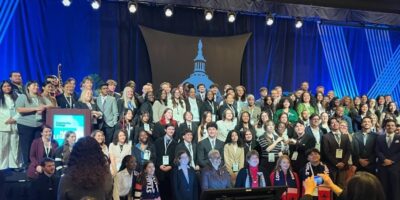By Lane A. Glenn and Pavel Payano
Note: This article appeared in the March 25, 2023 editions of Commonwealth Magazine and the Eagle Tribune.
For a state that that relies as much on immigration as Massachusetts does, we are falling farther behind the rest of the country when it comes to economically competitive policies and funding for our young, undocumented residents seeking a college education.
That’s the finding of a recently released report from the Education Trust, “Higher Education Access and Success for Undocumented Students Start with 9 Key Criteria,” which analyzes fifteen states that have the largest populations of undocumented college students, including Massachusetts, to determine whether their policies are helping or hurting undocumented students’ ability to succeed.
The report examines these nine questions:
- Can undocumented students enroll in the state’s public two- and four-year higher education institutions?
- Do undocumented students have access to in-state resident tuition?
- Do undocumented students have access to state financial aid?
- Do undocumented students have access to professional or commercial licenses?
- Do undocumented students have access to a driver’s license?
- Do undocumented students have access to state-level health care programs?
- Do undocumented students have access to state-level food programs?
- Do undocumented students have access to state-level housing assistance?
- Does the state have sanctuary policies limiting collaboration between local entities and federal immigration authorities?
Perhaps not surprisingly, more liberal-leaning states like California, New York, and Washington tend to have policies and funding that provide strong support for undocumented college students.
For example, each of these states offers undocumented students comprehensive enrollment access at all of their community colleges and universities, charges them in-state resident tuition (which typically reduces tuition bills by 50% or more), and offers access to state financial aid, even as they vary according to other benefits they provide, such as access to health care, food, and housing assistance.
But even more conservative-leaning states like Arizona, Texas, and Florida have similar policies and funding available for their undocumented college students.
Why?
Because they recognize the competitive importance of educating and retaining the talent they need for a healthy state economy.
In fact, according to the National Immigration Law Center, nearly half of all states, all across the political spectrum, now have “tuition equity” laws or policies that offer in-state tuition rates to undocumented students who meet certain requirements; and in a growing number of states, undocumented students are eligible for financial aid.
But not in Massachusetts.
Here, only students already registered with DACA (Deferred Action for Childhood Arrivals) are eligible for in-state tuition, and the only form of financial aid available to them is the John and Abigail Adams Scholarship, which provides a modest tuition credit (nowhere near 50% of the bill) at one of the state’s 28 public college and university campuses.
In the fall of 2022, according to the U.S. Department of Homeland Security, there were 4,950 DACA-registered students in Massachusetts.
Meanwhile, the Migration Policy Institute estimates there are another 16,000 undocumented residents in the state eligible for DACA, but thanks to an October 2022 U.S. Court of Appeals Fifth Circuit Court ruling, no new DACA requests are being processed, and the decade-long program, despite bipartisan support from two-thirds of American voters, is in danger of disappearing.
States like Massachusetts are on our own.
If this doesn’t concern you yet, then consider:
A recent survey by United Van Lines listed Massachusetts as the 7th “Most Moved From” state in the nation in 2022. Soon after, the Boston Globe published an in-depth report that found more than 110,000 people left the Bay State since the COVID-19 pandemic began.
While our overall population has continued to grow slowly, it is largely thanks to first- and second-generation immigrants, including young, undocumented residents, mostly living in Gateway Cities like Lawrence, Haverhill, and Methuen up here in the Merrimack Valley, and places like Fitchburg, Chelsea, Brockton, and others all across the Commonwealth.
In fact, as the Massachusetts Immigrant and Refugee Advocacy Coalition reports, the foreign-born share of our workforce has climbed from 12% in 2000 to nearly 20% today.
And we’re going to need them.
In “Sizing Up Massachusetts’ Looming Skilled-Worker Shortage,” the Massachusetts Institute for a New Commonwealth (MassINC) predicts the state is going to be nearly 200,000 college-educated adults short of the workforce we will need by 2030.
At a time when our state is losing population rapidly, immigrants, including young, undocumented college students, are key to sustaining our economy.
Massachusetts public college students are more likely (85%) to live and work in the state following graduation, and consider the work that they do: Nearly a third of our STEM workers, as well as a significant number of healthcare workers and educated workers in other industries, are first-generation immigrants.
By moving aggressively to provide in-state tuition and access to financial aid for these undocumented students, Massachusetts will close the economic competitiveness gap with other states and take important steps toward better preparing the workforce we need right now, and in the future.
Lane A. Glenn is president of Northern Essex Community College and Pavel Payano is Massachusetts State Senator for the First Essex District.






